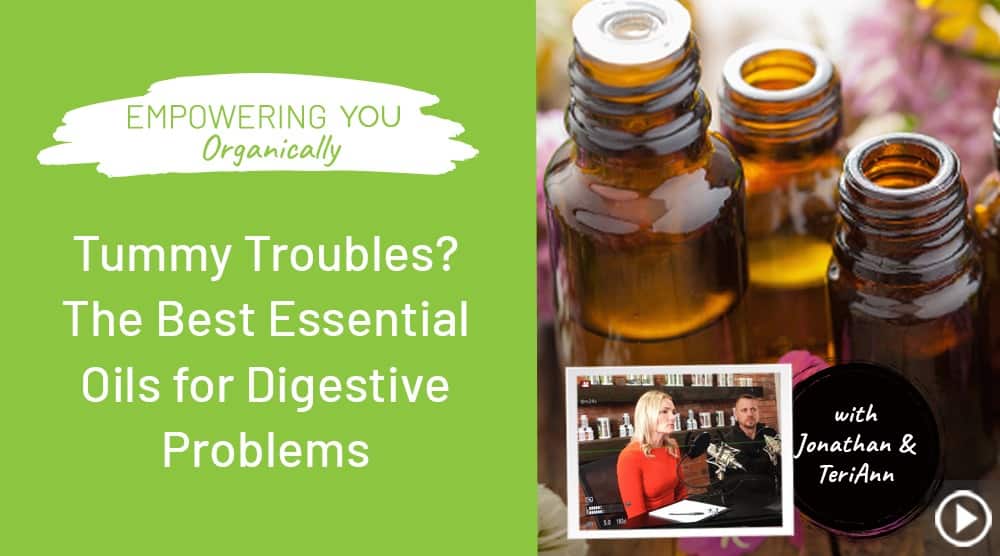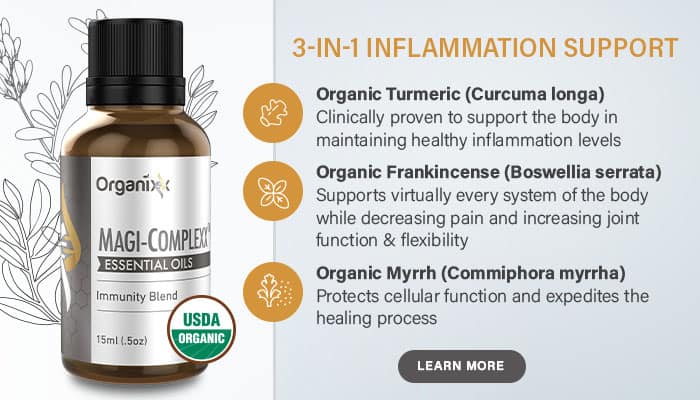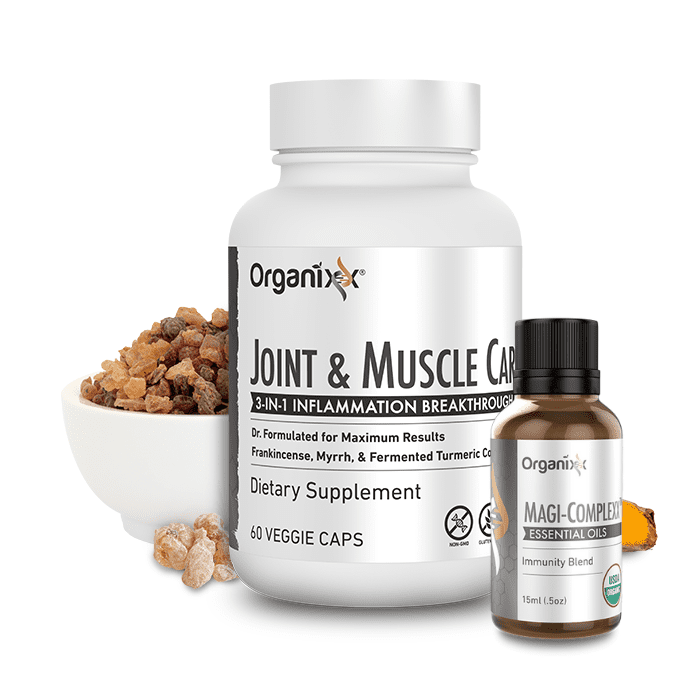Empowering You Organically – Season 11 – Episode 95
Title: Tummy Troubles? The Best Essential Oils for Digestive Problems
Hosts: Jonathan Hunsaker & TeriAnn Trevenen
Guest: None
Description: If you’re like most people, you probably don’t give much thought to your digestive system except when you’re experiencing a tummy ache or other issues such as gas, constipation, and diarrhea. In this episode, we’ll delve into ways to keep your digestion humming along including using essential oils for digestion when things aren’t running smoothly.
* * *
FEATURED PRODUCT
This Powerful Anti-Inflammatory Supports a Healthy Heart, Boosts the Thyroid, and Promotes Brain Function
- 3 NATURAL INFLAMMATORY SUPPORT AGENTS:Our revolutionary formula combines Frankincense, Myrrh & organic fermented Turmeric into a powerhouse anti-inflammatory supplement.
- SOOTHE ACHING JOINTS: Each of these ancient treasures has been shown through studies to help alleviate joint pain, soothe aching joints and decrease inflammation.
- INCREASE MEMORY & ALERTNESS:Frankincense has been scientifically demonstrated to support a healthy heart, support normal thyroid function, and promote memory and brain function.
- CLEAN INGREDIENTS:We use only the purest and cleanest ingredients. Our Joint & Muscle Care contains all natural ingredients free from fillers, binders and excipients.
* * *
Tummy Troubles? The Best Essential Oils for Digestive Problems
If you’re like most people, you probably don’t give much thought to your digestive system except when you’re experiencing a tummy ache or other issues such as gas, constipation, and diarrhea. In this article, we’ll delve into ways to keep your digestion humming along including using essential oils for digestion when things aren’t running smoothly.
Why a Healthy Digestive System Matters
Did you know that not only is your digestive tract important for breaking down food for nourishment, it also plays an important role in immunity, brain health, and cognition!
The Link Between Digestive Health and the Brain
There is an increasing number of scientific studies that have identified a direct link between digestive health and the brain and emotions. Studies consistently show that gut health (or lack thereof) can have an enormous effect on mental health issues such as depression, anxiety, and even autism [1-4].
Hippocrates, known as the Father of Medicine (460-370 BC) believed that all disease processes began in the gut. Although the digestive system is often thought to comprise only the stomach and intestines, it is actually much more inclusive than that. In order to function at optimally, the digestive system requires peak performance from the stomach and intestines, as well as the liver, kidneys, and gallbladder.
7 Ways to Improve Gut Health
There are many steps we can take to better care for our digestion. These include:
- eating lots of fresh, organic, fiber-rich fruits and vegetables
- focusing on the consumption of nutrient-dense foods
- taking probiotics and/or enzymes
- reducing stress (which has an enormous impact on the gut)
- getting better sleep
- exercising
- using essential oils
Millions of American Suffer from Gut Issues
When the digestive tract is compromised, it can make you feel over-tired, suffer from lowered immunity, gain weight, and experience gastrointestinal discomfort.
Sometimes you experience stomach pain or cramping, as well as belching, gas, and bad breath. At other times you may feel bloated, nauseous, or have other issues.
In the United States alone, the National Institutes of Health advise that 60 to 70 million people are affected by digestive diseases such as irritable bowel syndrome (IBS) and gastroesophageal reflux disease (GERD) [5].
The Problem with Over-the-Counter Medications
For years, people have relied upon over-the-counter medications for digestive complaints. These products often contain bismuth subsalicylate, which comes from the aspirin family and has anti-inflammatory, anti-spasmodic, and acid-reducing action.
The potential problem with these sorts of medications is that they are only recommended for use for a couple of days. This means people who have problems that last longer than that (e.g., IBS, chronic heartburn, or acid reflux from GERD) aren’t supposed to use these products for more than two days.
It’s also not advisable for children to take them, nor anyone with the flu, because bismuth subsalicylate is contraindicated on the label for anyone with the flu, a virus, or chickenpox. Taking this medication increases the risk for the development of Reye’s syndrome, a potentially life-threatening illness.
Are Essential Oils for Digestion a Good Alternative?
Certain essential oils and blends can greatly benefit digestive health due to their anti-inflammatory, calming, anti-spasmodic, and cell-protective benefits.
For example, Organixx Digest Essential Oil Blend was specifically designed to provide relief for a wide range of digestive issues. The four oils in Digest Blend work together in a beautiful synergy and all are backed by research indicating their method of action. While we are no longer selling our essential oil blends (including Digest), you may have a bottle on hand!
The next time digestive distress strikes try the ready-made Digest Blend or use any or all of the following four essential oils for digestion and create your own blend. The simplest recipe is just to use equal parts of each or try different ratios and see what works best for you.
4 Key Essential Oils for Digestive Problems
1. Ginger Essential Oil
A 2014 meta-analysis [6] of medical studies investigated the efficacy of ginger for early pregnancy nausea and vomiting. Researchers found that at least four days of taking ginger was associated with a five-fold likelihood of improvement in morning sickness symptoms.
A small 2016 study [7] with post-surgical patients found that inhalation of ginger essential oil significantly decreased nausea and vomiting during the first six hours after inhalation of ginger. Ginger has also been found to be beneficial for travel/motion sickness. A small 1988 double-blind randomized placebo trial [8] found ginger to be helpful for vomiting, nausea, cold sweats, and vertigo for Danish naval cadets not accustomed to sailing on heavy seas.
Another small 2013 clinical trial [9] of 13 volunteers with a history of motion sickness found that pre-treating with ginger reduced nausea, quieted stomach activity, and prolonged the period between attacks of nausea. A 2005 study [10] investigated how ginger actually works on the digestive tract. Researchers found that ginger helped relieve intestinal spasms, and also had direct effect on the parasympathetic nervous system, which is active during the digestive process. They found that ginger assisted with hyperactive states of the gut as is found with diarrhea and colic.
A 2015 animal study [11] found that ginger essential oil inhibited the formation of gastric ulcers by 85%. Ginger also increased antioxidant enzymes and reduced the erosion, hemorrhaging, and necrosis (untimely cell death) of cells of the stomach wall, thus providing a protective effect. Ginger may also be beneficial in cases of ulcerative colitis, a painful inflammatory condition that can cause rectal bleeding, bloody diarrhea, and abdominal cramping.
A 2018 animal study [12] found that 6-gingerol, an ingredient in ginger, increased important antioxidants and inhibited the inflammatory pathways that contribute to this disease.
2. Peppermint Essential Oil
Peppermint (Mentha piperita) is well known for the assistance it can provide for our tummies. If you have over-indulged in your favorite food, are feeling nauseous with a virus, or suffer with more chronic problems of the digestive tract, peppermint can be incredibly soothing.
It is a beautifully cooling aromatic oil that is also:
• anti-inflammatory
• anti-spasmodic
• analgesic (pain relieving)
There are many studies that reflect the benefits of peppermint oil for the digestive system. For instance, a 2007 study [13] found a 50% reduction in the symptoms of irritable bowel syndrome (IBS) in 75% of patients who tried peppermint oil for their symptoms.
Indeed, a 2019 review [14] of a dozen randomized trials including over 800 patients using peppermint oil for IBS symptoms found that peppermint oil was safe and effective.
2013 research [15] found that both peppermint and spearmint reduced the intensity and frequency of chemotherapy-induced nausea and vomiting.
An older 2008 study [16] investigated the use of peppermint for dyspepsia (pain or discomfort in the upper abdomen, also known as indigestion). Researchers found that peppermint oil was safe and effective for dyspepsia, and also for reducing the abdominal pain, flatulence, and diarrhea for those with IBS.
Studies have found that peppermint oil is good for children, too. In a 2014 review [17] of 14 clinical trials involving nearly 2,000 children, peppermint oil was found to reduce the frequency, duration, and severity of abdominal pain. [Caution: only use essential oil with children under the direct supervision of a qualified practitioner.]
3. Lemon Essential Oil
Lemon (Citrus limon) has an uplifting fresh citrus aroma. Lemons have a long history of use by traditional Ayurvedic doctors as an aid for many ailments, including digestion. Modern research is starting to catch up, and it shows that lemon oil relieves nausea and vomiting and is:
• anti-inflammatory
• antimicrobial
• anti-parasitic
• anti-fungal
A 2014 clinical trial [18] found that inhaling lemon oil significantly relieved nausea and vomiting in 100 pregnant women. A 2020 study [19] investigated the phytochemicals in lemons with regard to their potential therapeutic benefits.
Researchers found that lemons had anti-inflammatory, antimicrobial, anti-parasitic, and anti-cancer benefits. All of these properties combined have benefits for overall digestive health.
A difficult-to-eradicate yeast known as Candida albicans can cause major trouble for the digestive tract. When C. albicans invades the digestive tract, it can cause oral thrush (a burning sensation in the gut after eating certain foods), recurring genital and urinary tract infections, even ulcerative colitis, and Crohn’s disease.
Candida overgrowth is especially rampant among immunocompromised people, the elderly, those on broad-spectrum antibiotics, overstressed people with a high intake of sugar, carbs, and alcohol, and individuals hospitalized in intensive care units.
A 2019 study [20] found that lemon oil (among other essential oils tested) had strong anti-Candida activity against several lines of Candida species.
4. Fennel Essential Oil
Fennel (Foeniculum vulgare) has a long history of use as a medicine and especially for digestive difficulties. Studies [14] indicate fennel is:
- antioxidative
• anti-inflammatory
• anti-ulcer
• anti-viral
• anti-spasmodic
• antimicrobial
• DNA protective
• has blood-sugar-lowering and cholesterol-lowering properties
A 2018 animal study [22] found that administering fennel oil significantly improved antioxidative status, reduced inflammation, and reduced blood sugar levels in rats with dyslipidemia (an abnormal amount of fats such as triglycerides and cholesterol in the blood).
A 2011 study [23] investigated the effects of the phytochemicals in fennel on rats with gastric ulcers. Researchers found fennel to have significant anti-ulcer activity and may help to prevent ulcers.
3 Ways to Use Digest Essential Oil Blend for Digestive Problems
#1. Apply a few drops of Organixx Digest blend across the abdomen and/or low back, massaging it in gently but thoroughly. To improve absorption, place a warm compress across the belly and/or low back after applying Digest. Dilute first with an organic carrier oil such as almond, coconut, hemp, or avocado oil. Try using 3-5 drops of Digest per teaspoon of carrier oil.
#2. Place a couple drops of Digest blend into your palms, rub them together, and tent hands over your nose and mouth, being cautious to avoid eyes. Breathe the oils in deeply for a few moments, holding the essential oil vapor in your lungs for 5-10 seconds (or for as long as you can). This helps get the essential oils into your lungs and bloodstream and working quickly to relieve digestive difficulties.
#3. If you are suffering from nausea or motion sickness, using Digest blend on an acupressure point known as “Heavenly Appearance” (aka SI 17) can be quite beneficial. To locate this acupressure point, place a fingertip on the outside of the face, just below the earlobe in the indentation between the earlobe and the upper tip of the jawbone (on both sides of the face). Place a drop or two of Digest on your fingertips and gently massage this point. It can be tender, so go gently.
Considerations When Using Essential Oils for Digestive Problems
While the four essential oils in Organixx Digest Blend are all derived from plants that are also foods/spices, essential oils are highly concentrated and should only be ingested under the guidance of a qualified healthcare provider. For any persistent pain or digestive difficulties, be sure to consult your doctor.
Essential oils should not be used as replacements for medicine but to support overall health.
Never apply essential oils anywhere near eyes, the inside of the ears, or to other sensitive regions of the body. Women who are pregnant or breastfeeding and children should always seek their doctor’s advice prior to using essential oils.
Be aware that essential oil products vary greatly between makers in purity, strength, and quality. Only purchase pure, organic essential oils from companies you trust.
***
Subscribe to Empowering You Organically
Never miss an episode!





